2024 budget: Not about size, but impact
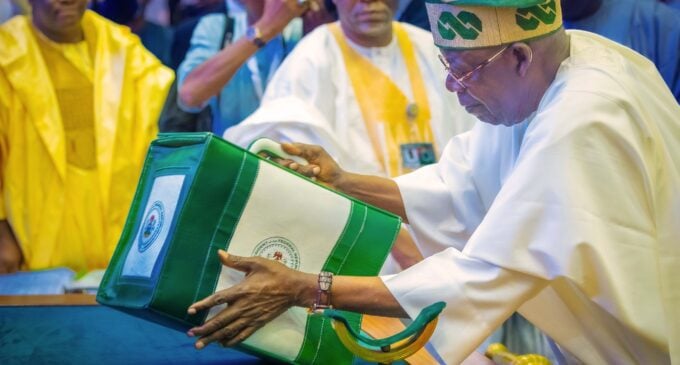
In line with sections 81 and 82 of the 1999 constitution, the 2024 appropriation bill has been passed into law, after it has, as a matter of constitutional necessity, been subjected to parliamentary scrutiny by the two chambers of the national assembly — the senate, and the house of representatives. That has culminated in it becoming known as the “2024 Appropriation Act”, popularly known as the “2024 annual budget”. It is reputed for being the biggest ever budget in terms of monetary value—the volume of money involved, in the history of Nigerian nationhood.
The size of what was submitted by President Bola Tinubu to the national assembly was put at ₦27.5 trillion as a proposal. But, the lawmakers would later jerk it up by an additional ₦1.2 trillion bringing it up to ₦28.7 trillion. That is compared to the 2023 budget which was a total of ₦21.83 trillion, which represents a 31.470% increase.
For the sake of those who are financially illiterate like, myself: ₦10,000, into one thousand places gives you ₦1,000,000 (one million Naira). And ₦1,000,000 into one thousand places gives you ₦1,000,000,000 (one billion Naira, while ₦1,000,000,000 (one billion Naira) into one thousand places gives you ₦1,000,000,000,000 (a trillion Naira). Imagine that amount in 28 places! That is the amount the federal government has to play with for the 350 days, or thereabout.
One of the things that excite me the most about this year’s budget, like the last two, is that its passage (into law) was on time, following section 318 of the 1999 constitution — which defines “a financial year” as the period starting from January 1 to December 31 of every calendar year, stemming from section 81, subsection 1.
But being the first budget to be prepared under the administration of President Tinubu, it should not be about the size, but its impacts on the socio-economic lives of Nigerians, considering what Nigerians are going through, economically, at the moment. It should be reflective of the “Renewed Hope” Agenda of President Bola Tinubu. Ordinarily, therefore, one should expect it (the budget) to take care of those areas where most of the economic policies (fuel subsidy removal, floating of the Naira, among others) are hurting the citizens, especially the poor masses.
Let us highlight some of those critical areas, in juxtaposition with the actual budgetary provisions for each of them:
Food
There is no gainsaying the fact that our national food security, (derivable from a complete self-sufficiency in local food production and eventual surplus export) has been under a very severe threat, from insecurity, lack of sincerity of purpose or political will in the implementation of agricultural policies, as well, as the adverse effects of climate change. These include desert encroachment, and flooding, among other climate-change-related natural disasters. The issue of ensuring adequate complete self-sufficiency in local food production for the citizens, is mainly, within the purview of the Federal Ministry of Agriculture and Rural Development. Whatever responses the federal, and other subnational governments have to the threats to our national food security, should be discernible through the provisions made for them in the annual budget.
For instance, the agricultural sector budget for the year stands at ₦362 billion, out of which ₦102. 5 billion was allocated to the National Agricultural Development Fund (NADFUND), a sum that translates to about 28% of the entire sector’s budgetary allocation. Out of this, ₦1.2 billion is for the purchase of an office building for the agency, equipment as well as maintenance. In addition, ₦70 million is also earmarked for the purchase of the agency’s office furniture, partitioning, and fittings in the 2024 budget. The sum of ₦450 million is earmarked for the purchase of operational vehicles for the agency. The rest goes into staff emolument, vehicle fueling and maintenance.
One may want to ask; how much of the total sectoral allocation gets to the field where it will directly impact the national productivity? Your guess is as good as mine, in a society where corruption and fiscal recklessness are multi-layered.
Provision of equipment for hire, at a subsidised rate; the provision of other inputs like seedlings, pesticides, herbicides, and fertilisers; rural access roads to facilitate the ease of evacuation of farm produce to the market, to guarantee the reward of the farmers for their labour, among others, should be the ones to receive the kind of attention, being lavished on the NADFUND. But I can tell you for free that, this kind of frivolity will be replicated in other agencies and parastatals under the ministry. I, therefore, recommend that the president includes in the list of deliverables by the minister(s) for agriculture and rural development, the need for a measurable boost in local food production, eight or ten months from now, compared to the past couple of years to bring down prices of foodstuff that have gone out of the roof, since Tinubu came on board in late May.
Defence and security
Closely connected to self-sufficiency in food production is defence and security. Farmers need to feel safe and secure on the farm before they can produce to feed the nation. It is, therefore, no coincidence that there has been a drastic decline in the productivity of the local farmers since Nigeria began to battle insurgency and banditry in those parts of the country, where the bulk of what the nation feeds on is produced — the North Central, and the North East.
Most of the farmers have either been killed, or are internally displaced, and are living in IDP (internally displaced people) camps around the country. So, it is heartwarming to note that defence and security got the highest allocation from the (2024) budget. A total of ₦3.25 trillion, which represents about 12%. But the question is, how do we appropriate this humongous amount so that it brings about the desired impacts on our internal security and stability? It should be appropriated in such a way that farmers can go back to their farms without any fear of being attacked or kidnapped so that there can be increased production of food. Remember, it must be about impact, rather than the size.
Health
Currently, the cheapest medication is “do-not-fall-sick”. If you, whether by omission or commission, fall sick, may God help you, by the time you visit the pharmacy to procure recommended drugs. Treating ordinary malaria now costs nothing less than ₦5,000 (that is if you choose to self-medicate). But if you have to consult a doctor, and get a prescription and treatment from the same hospital, irrespective of your bank account balance, you would leave the hospital, at least, ₦20,000 poorer than you walked in.
This is owing to the skyrocketing cost of medicine because, the falling value of the Naira against the US Dollars makes operating in Nigeria unprofitable for companies that are subsidiaries of multinationals, who would need to import raw materials (active ingredients) and repatriate their profits in the face of a weak Naira against the Dollar. They’re, therefore, pulling out of the country, and the drugs they, hitherto, manufactured here locally now have to be imported, in the face of the floated currency with dwindling value. For example, the price of Augmentin (a broad spectrum antibiotic drug), manufactured by a US company, called GlaxoSmithKline (GSK), has now increased from about ₦4000 in June last year, to ₦25,000, since the company closed its local manufacturing plants due to the above reason and others. The same goes for those other drugs being imported.
Come to think of it, this is a country where the payment of ₦30,000 as the minimum wage has been a tug-of-war between civil servants and the governments at all levels. One can then imagine a family of five, living on the ₦30,000 minimum wages, should two or three of them have to treat malaria within the same month. They would be left in debt for the next couple of months. So, what provision does the budget have to mitigate the effects of this rising cost of healthcare service delivery in the country? The answer to the question should reflect in the budget, in the way and manner the ₦1.38 trillion (5.03% of the 2024 budget) the Health sector receives as allocation is intended to be appropriated among subsectors within the purview of the Ministry.
Although the paltry 5% is a far cry from the recommendation by the African Union (AU) that countries should allocate at least 15% of the country’s annual budget to the health sector, we can still achieve some things if priorities are set right. The AU’s 15% benchmark is a commitment, which was made by heads of African countries in 2001, now known as the ‘Abuja Declaration’ — a collective effort to promote increased funding for the health sector in the region.
Meanwhile, global reports have always rated Nigeria as the country with the highest cases of malaria in the world, accounting for 27% of global cases, and 32% of malaria-caused deaths globally. Let us not mention the incident of brain drain in the sector, due largely to poor funding resulting in ill-equipment, and poor remuneration for personnel in the sector. The allocation of funds in the sector should address these issues.
Education
There is a famous statement by the first post-apartheid South African President, the late (Dr.) Nelson Mandela, displayed at the entrance of the University of South Africa, thus: “Destroying any nation does not require the use of atomic bombs or the use of long-range missiles. It only requires lowering the quality of education and allowing cheating in the examinations by the students.”
In describing the products of such an educational system, the iconic South African leader went further to say, “Patients die at the hands of such doctors. Buildings collapse at the hands of such engineers. Money is lost in the hands of such economists & accountants. Humanity dies at the hands of such religious scholars. Justice is lost at the hands of such judges…”
He concluded by stating that, “the collapse of education is the collapse of a nation”.
It is not a coincidence, that the United Nations Educational, Scientific and Cultural Organization (UNESCO), to improve the quality of education in any country, recommends an ideal, 26% of the totality of a country’s annual budget, as the amount to be allocated to education. But very few nations around the globe hearken to the admonition, and unfortunately, Nigeria is not one of them.
Meanwhile, there is empirical evidence of all the indices of development in those countries that spend significantly more on education, when juxtaposed with those countries that do not. The educational sector, despite being one of the sectors with the highest budgetary allocation per the 2024 appropriation act, received ₦1.44 trillion, which is about 5.017% — a far cry from the UNESCO-recommended 26% of the total annual budget to the sector. Let us take a look at the gap between the funding for education in Nigeria, on a comparative note with other sectors or institutions: the 2024 budgetary allocation to the institution of the National Assembly is higher than the combined allocations to 26 federal universities in the federal budget proposal, according to a report.
Due to the aforementioned fact, funding is becoming increasingly difficult for these institutions, and parents and guardians. The above catastrophes highlighted by Mandela could also happen to a nation where the quality of education is not lowered, but access to it by the citizens is restricted, either through legislation, executive policies or where exorbitant fees are charged. Furthermore, in a situation where quality education is priced beyond the affordability of the common man, such a nation would be denying itself opportunities for rapid and meaningful development in all facets of life.
Those parents with a high appetite for quality education for their wards have had to bear the burden by paying increased fees. Privately owned schools that are fairly better equipped than the government-owned charge higher fees than most parents and guardians could afford. Meanwhile, you’d agree with me that, education remains one of the most scientific means of escaping the sting of poverty, even though it might not make you a billionaire. President Tinubu therefore, must ensure that he implements policies that will make quality education more affordable to the poor masses, as it is one of those expenditure handles that eat family income. After all, “education makes people easy to lead, but difficult to drive, easy to govern, but difficult to enslave, according to Henry Peter Brougham.
Power and transportation
The cost of powering a home has been at its highest in the history of Nigeria as a nation, since the administration’s policy of zero subsidy on petrol, and other petroleum products became effective on the 29th of May 2023. Its ripple effects are more discernible on the rate of inflation (cost-pushed). The high cost of production, as a result of the increase in pump price has, either led to the closure of businesses, or equally high prices of goods and services. This is because any increase in the operational expenses of businesses is passed on to the ultimate consumers of their products and services. What, therefore, is in the budget, that shows that the government is working towards bringing down the cost of energy, or on the path of “energy transition”?
Cooking gas has gone beyond what most Nigerians can afford, as its price (₦1090 per kg) is now higher than those of diesel and kerosene. It has more than tripled in the past 18 months or so. Electricity distribution companies (DISCOS) in collaboration with the National Electricity Regulatory Commission (NERC) have been angling to hike the price of electricity units in the country but for the presidential fiat of Tinubu who has vetoed the move.
Beyond that, Nigerians need to start seeing the effect of the deal with the German outfit, Siemens Energy AG, to bring an “end-to-end modernization and expansion of Nigeria’s electric power transmission grid with the full supply, delivery, and installation of Siemens-manufactured equipment”, according to a report emanating from the State House. This is expected to bring about a more stable power supply across the country. Did I see any provision in the budget to bring down the cost of energy for Nigerians? I doubt if I did, beyond the mention of ₦40 billion being an amount for settling outstanding debts of MDAs to the various DisCos. Except there will be an extra-budgetary allocation, not much has the budget to do with power improvement. I hope to be wrong.
Transportation cost has, also, more than quadrupled from the date (May 29, 2023) when total subsidy removal was announced. Apart from the high cost of energy and increasing operational expenses of transporters, there is also the issue of dilapidated roads across the country. This has led to transporters, justifiably, increasing fares to cover the costs incurred in repairing their vehicles, after being subjected to road torture by craters and potholes. Those roads deserve priority attention for an instant impact on the livelihood of the people. I don’t think it would be too much to declare a state of emergency on the current conditions of those roads, especially the ones that belong to the federal government — Trunk A — connecting major commercial cities to the rural areas which serve as sources of food supply to the urban centres.
That is why I asked in my article, the last for the outgone year I asked who is fighting for the allocation of FERMA to be increased for optimum performance in road maintenance.
In the said article, I wrote: “Out of a total capital of ₦453,255,980,966.00 allocated to the ministry in the 2024 appropriation bill, FERMA gets a paltry ₦17, 525,286,292.00”. Would that not amount to a drop in the ocean, because, there are over 97,000 kilometres of road networks under the agency’s purview?
In addition to fixing the failed portions of the roads, Nigeria can make do with more rail lines, connecting major economic cities to boost trade and reduce the cost of transportation, especially, the cost of moving people, goods, and services from one location to another. It is interesting, however, to note that with a much smaller budget, if we get our priorities right with the budget, the current socio-economic pain to which Nigerians are being subjected can be mitigated through the instrumentality of judicious and prudent implementation of the allocated funds. The size of the budget should not unnecessarily excite us. Rather, the impact it is intended to make on the livelihood of the citizenry should be the focus of our collective attention.
Abubakar writes from Ilorin. He can be reached via [email protected].
Views expressed by contributors are strictly personal and not of TheCable.








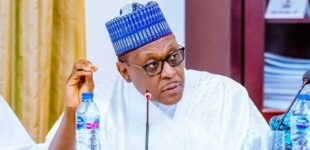
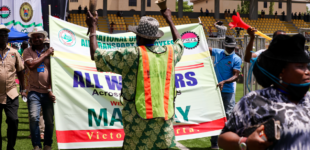
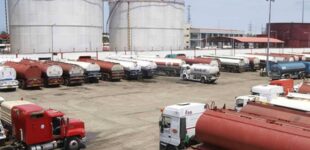
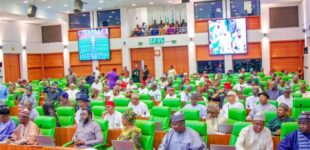


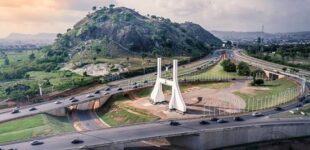

There are no comments at the moment, do you want to add one?
Write a comment